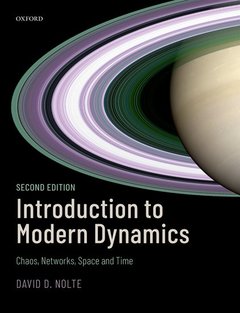Description
Introduction to Modern Dynamics (2nd Ed.)
Chaos, Networks, Space, and Time
Author: Nolte David D.
Language: English
Publication date: 09-2019
512 p. · 18.9x24.6 cm · Paperback
512 p. · 18.9x24.6 cm · Paperback
Description
/li>Biography
/li>
The best parts of physics are the last topics that our students ever see. These are the exciting new frontiers of nonlinear and complex systems that are at the forefront of university research and are the basis of many high-tech businesses. Topics such as traffic on the World Wide Web, the spread of epidemics through globally-mobile populations, or how the synchronization of global economies are governed by universal principles just as profound as Newton's laws. Nonetheless, the conventional university physics curriculum reserves most of these topics for graduate study because of the assumed need for advanced mathematics. However, by using only linear algebra and calculus, combined with exploratory computer simulations, all of these topics become accessible to advanced undergraduate students. The structure of this book combines the three main topics of modern dynamics - chaos theory, dynamics on complex networks, and general relativity - into a coherent framework. By taking a geometric view of physics, concentrating on the time evolution of physical systems as trajectories through abstract spaces, these topics share a common and simple mathematical language through which any student can gain a unified physical intuition. Given the growing importance of complex dynamical systems in many areas of science and technology, this text provides students with an up-to-date foundation for their future careers. This second edition has an updated introductory chapter and has added key topics to help students prepare for their GRE physics subject exam. It also has expanded chapters on Hamiltonian dynamics, Hamiltonian chaos, and Econophysics, while increasing the number of homework problems at the end of each chapter. The second edition is designed to fulfill the textbook needs of any advanced undergraduate course in mechanics.
David D. Nolte is a Professor of Physics at Purdue University and is an internationally recognized researcher in laser photonics. He received his baccalaureate from Cornell University and his PhD from the University of California at Berkeley. He is the author of over 160 journal papers, has secured 14 US patents in applied optics and biophotonics, and is the technical founder of two small start-up companies: Perfinity, Inc., a molecular diagnostics company, and Animated Dynamics LLC, a cancer therapeutics company, both located in West Lafayette, IN. David is a Fellow of the Optical Society of America, a Fellow of the American Physical Society and a Fellow of the American Association for the Advancement of Science. He was a Research Fellow of the Alfred P. Sloan Foundation, and a Presidential Young Investigator of the National Science Foundation. In 2005 he received the Herbert Newby McCoy Award, which is the highest scientific honor awarded by Purdue University.
© 2024 LAVOISIER S.A.S.




